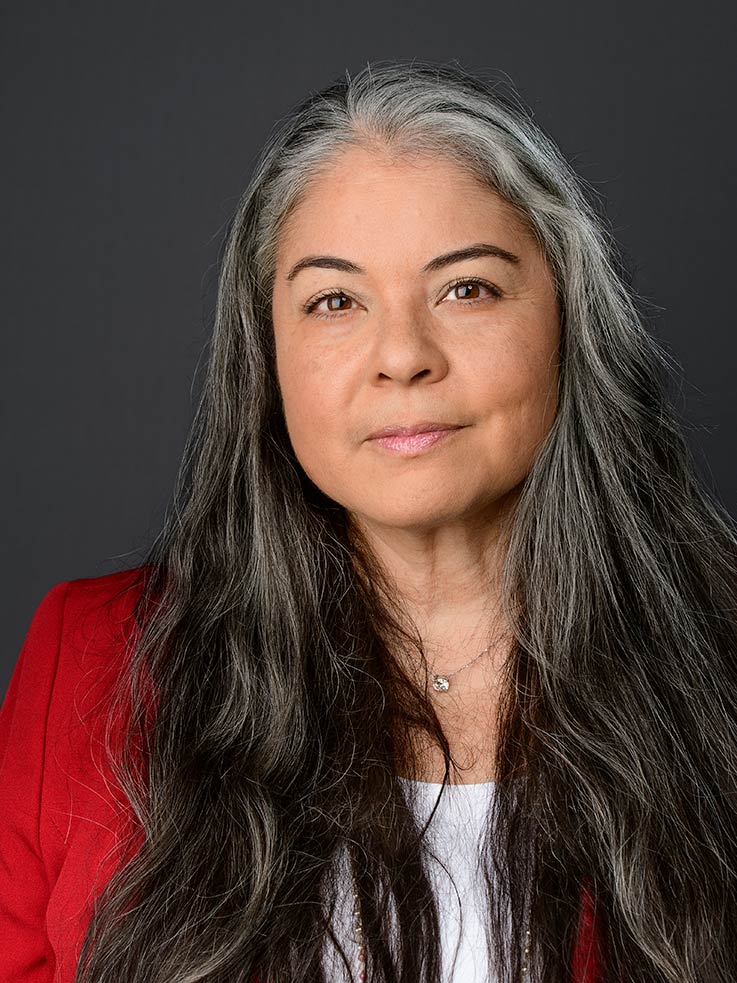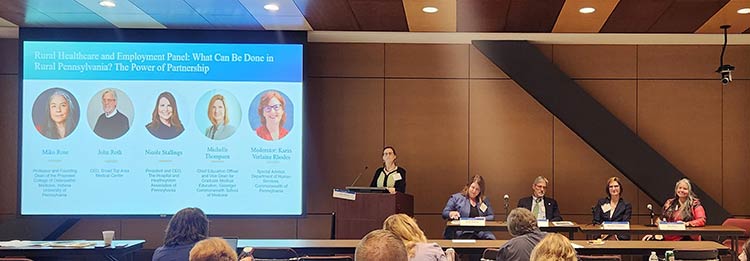 Miko Rose
Miko Rose
The founding dean of Indiana University of Pennsylvania’s proposed college of osteopathic medicine, Miko Rose, will be a panelist during the Rural Economic Development Summit on June 3, hosted by the Federal Reserve Bank of Philadelphia.
Rose’s panel discussion is titled “What Can Be Done in Rural Pennsylvania? The Power of Partnership.”
She will be joined on the panel by John Roth, CEO of Broad Top Area Medical Center; The Hospital and Healthsystem Association of Pennsylvania President and CEO Nicole Stallings; and Geisinger Commonwealth School of Medicine Chief Education Officer and Vice Dean for Graduate Medical Education Michelle Thompson. Pennsylvania Department of Human Services Special Advisor Karin Verlaine Rhodes will moderate the discussion.
The June 3 event, “Rural Economic Development Summit: Health Ecosystems and Workforce Pipelines,” is hosted in partnership with the Center for Rural Pennsylvania and the Pennsylvania Office of Rural Health. It features a number of healthcare officials, including Commonwealth of Pennsylvania Secretary of Human Services Valerie Arkoosh.
“It’s an honor to be part of this important event and to be part of the discussion about new ways to support and grow strong healthcare networks in Pennsylvania’s rural communities,” Rose said.
“Healthcare accessibility for so many Pennsylvanians is at crisis levels. Beyond the human factor—every person’s right to competent and compassionate care—the lack of a strong healthcare system absolutely affects the commonwealth’s economic viability and strength,” Rose said.
“IUP’s proposed college of osteopathic medicine is focused on helping to address the need for talented physicians who want to serve the commonwealth’s rural communities; but this is a shared responsibility, requiring the commitment of healthcare professionals, community leaders, legislators, and state officials,” she said.
“Pennsylvania is incredibly fortunate to have legislators and healthcare officials who recognize the urgency of this issue, who are willing to make it a focus of their work, and who truly support strengthening rural healthcare networks and IUP’s work to establish a college of osteopathic medicine,” she said.

Pennsylvania Department of Human Services Special Advisor Karin Verlaine Rhodes, at podium; from left, Hospital and Healthsystem Association of Pennsylvania President and CEO Nicole Stallings; John Roth, CEO of Broad Top Area Medical Center; Geisinger Commonwealth School of Medicine Chief Education Officer and Vice Dean for Graduate Medical Education Michelle Thompson; IUP proposed college of osteopathic medicine Founding Dean Miko Rose
In April, Rose was a featured speaker for the IUP-hosted Western Pennsylvania Regional Rural Health Summit, a collaboration with IUP, the Pennsylvania Department of Health, and the Pennsylvania Department of Human Services. This summit, attended by 150 community and healthcare leaders, included speakers and panelists including IUP President Michael Driscoll; Arkoosh; Secretary of the Department of Health Debra Bogen; Lindsey Mauldin, deputy chief of staff for Pennsylvania Governor Josh Shapiro; Pennsylvania Senator Joe Pittman; Pennsylvania Representative Jim Struzzi; Laura Dimino, assistant director of the Center for Rural Pennsylvania; and Lisa Davis from the Pennsylvania Center for Rural Healthcare.
IUP has formally initiated steps towards accreditation of its proposed college of osteopathic medicine from the American Osteopathic Association’s Commission on Osteopathic College Accreditation, following the IUP’s Council of Trustees’ December 2022 endorsement of an exploration of a possible development of a college of osteopathic medicine at IUP.
Once established, a college of osteopathic medicine at IUP is expected to generate $79 million in annual regional economic impact.
Doctors of osteopathic medicine, or DOs, complete four years of osteopathic medical school, with an emphasis on preventive medicine and comprehensive patient care. They are trained to recognize the interrelated unity among all systems of the body, each working with the other to promote overall health and wellness. Osteopathic medical schools have a long tradition of serving rural communities. Physicians who are trained in osteopathic medicine are four times more likely to select primary care specialties and almost twice as likely to practice in rural areas as allopathic (MD) students are.
IUP has secured more than $34.3 million in private and government funding for the initiative and has formal agreements with 13 clinical training affiliation agreements with area hospitals and healthcare providers, all in rural communities.
Securing clinical training sites for students is part of the successful accreditation process; IUP has 200 percent of the required training spots required for accreditation. Typically, students in colleges of osteopathic medicine spend the first two years of their education in the classroom; during the third and fourth years, students are based in the community at clinical sites.
IUP’s proposed college of osteopathic medicine, once established, would be the only college of osteopathic medicine at a public university in Pennsylvania.
Doctors of osteopathic medicine complete four years of osteopathic medical school with an emphasis on preventive medicine and comprehensive patient care. National data shows that more than half of the graduates of osteopathic medicine programs pursue a career in primary care, and many choose to practice in rural areas. There has been a 93 percent increase in applicants to colleges of osteopathic medicine since 2011.
Rose continues to be recognized for her expertise in osteopathic medical education, her leadership of IUP’s proposed college of osteopathic medicine, and her work to address the rural healthcare crisis through education of physicians who are committed to practicing in rural communities.
She developed a state-wide research study now underway, “Understanding Physician Retention in Rural Pennsylvania: A Collaborative Research Study.” The survey, being distributed by the Center for Rural Pennsylvania, is designed to determine commonalities of physicians who commit to, and stay in, rural healthcare practice.
She is one of City & State Pennsylvania’s Fifty Over 50 2024 honorees and was elected as a fellow of the American College of Neuropsychiatrists by the Fellows of the American College of Neuropsychiatrists/American College of Osteopathic Neurologists and Psychiatrists.
In 2019 and again in 2024, Rose received an award as one of the top medical educators in the country, the National American Osteopathic Medical Educator Fellowship Teaching award, which is a five-year fellowship.
A board-certified physician in psychiatry and neurology who is nationally known for wellness programming, Rose began work as the founding dean of IUP’s proposed college of osteopathic medicine in November 2023. She came to IUP from Pacific Northwest University of Health Sciences College of Osteopathic Medicine, where she was associate professor and chief of the Division of Psychiatry in the Department of Clinical Medicine and assistant dean for Clinical Education.
She was also an associate professor and program director of the Joy Initiative Wellness Program at Michigan State University. She founded and started the Joy Initiative at the Michigan State University College of Human Medicine and College of Osteopathic Medicine schools. She completed her medical training at Michigan State.
Prior to entering medical school, Rose worked as a program officer, fundraiser, and advocate for the underserved with a focus on overcoming domestic violence and trauma, and she has more than 25 years of experience and formal training in life coaching. Drawing upon her experiences with underserved communities, she creates and facilitates happiness training programs for medical providers and trainees across the country.
In 2013, Rose was awarded the SAMHSA American Psychiatric Association Minority Leadership Fellowship Grant, from which she built the foundation to develop emotional resilience, happiness, and mindfulness trainings tailored to meet the unique needs of medical providers.
She is responsible for offering one of the first formal classes on happiness and joy in medical schools in the nation—which she taught as a for-credit class in two medical schools for the past nine years. This curriculum has since expanded to provide training for peak performance for team coaches, trainers, and student athletes.
Rose is a 1995 graduate of Wellesley College, with a degree in psychology, and a 2009 graduate of Touro University College of Osteopathic Medicine, where she earned her doctor of osteopathic medicine degree.
She is the recipient of a number of competitive scholarships and fellowships and has been an invited presenter at more than 50 conferences and professional meetings, including the 2024 Osteopathic Medical Education Conference, the world’s largest gathering of osteopathic physicians.
She has authored more than 20 articles in professional publications and journals, including The DO, an award-winning national publication for osteopathic physicians and medical students. She was recently elected to serve on The DO’s editorial advisory board.